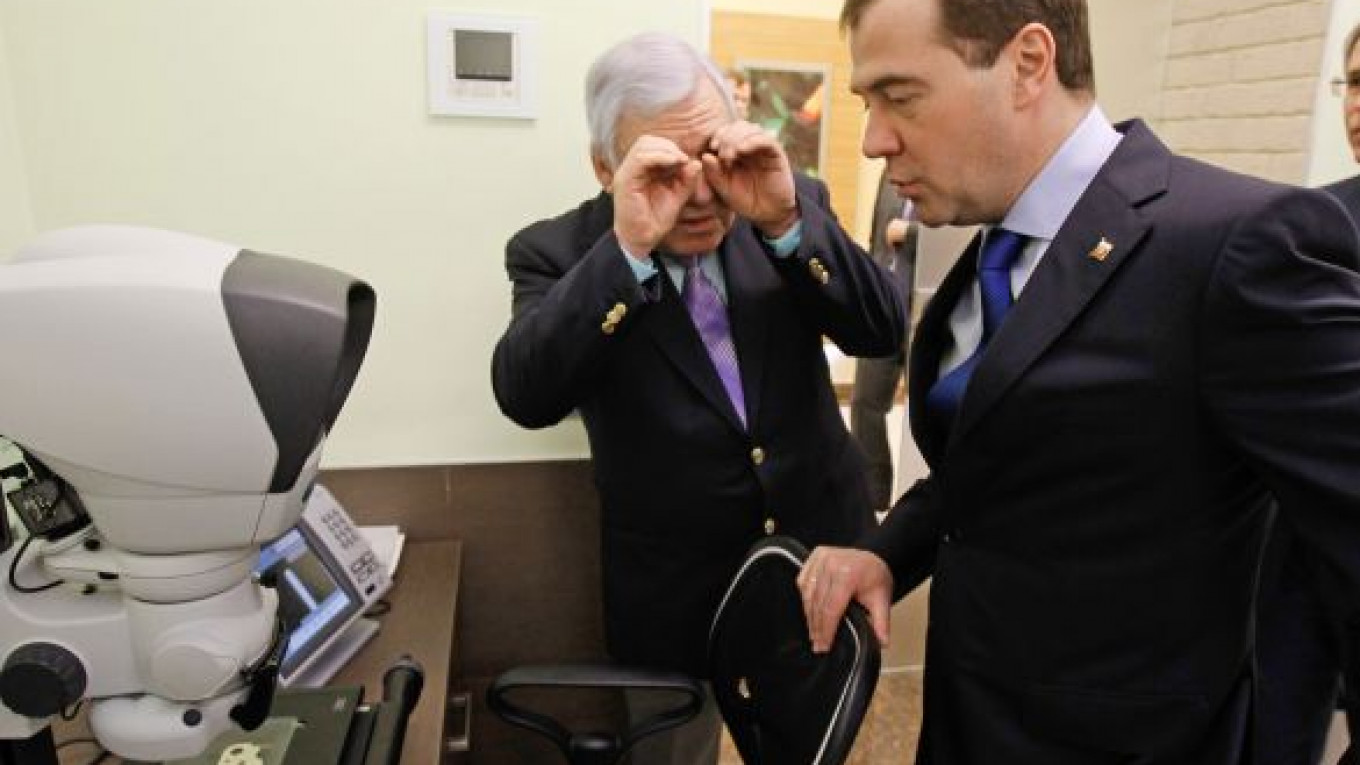Perhaps tipping the government's hand for the evolution of the Skolkovo Innovation Center during the next Putin era that begins next month, the technology hub's top executive said Wednesday that President Dmitry Medvedev should remain head of the board of trustees.
"I would like Dmitry Anatolyevich [Medvedev] to stay," Skolkovo Foundation president Viktor Vekselberg said on the sidelines of Wednesday's board of trustees meeting, RIA-Novosti reported.
Medvedev in November 2009 first proposed the creation of a high-tech hub to stimulate the Russian equivalent of Silicon Valley and spearheaded the development of what has become the Skolkovo Innovation Center. The president, who chaired the board meeting, is expected to be appointed prime minister when Vladimir Putin leaves that post and becomes president in early May. Currently, Medvedev personally heads the Skolkovo board of trustees.
Speculation that President Putin might want to chair Skolkovo is not well-grounded.
The president-elect has publicly discussed his disinterest in e-mail, the Internet and technology, while Medvedev is a fan of advanced technology and a regular user of his iPad, Twitter and Facebook.
During Wednesday's board meeting, Medvedev urged more involvement of state corporations in the new institute of higher learning that Skolkovo is establishing with the Massachusetts Institute of Technology. Calling it one of Skolkovo's current "difficulties," Medvedev said there is a lack of participation by state-controlled companies in the Skolkovo Institute of Science and Technology, or SkTech.
"It's time for them to get involved in this work quickly, especially in regards to operational and strategic goals for international-level research," he said at the trustee meeting, which was broadcast live to journalists.
The president also said the innovation center's endowment fund "will allow public companies to … get access to cutting-edge developments."
At the meeting, Medvedev, Vekselberg and other Skolkovo leaders assessed the progress made over the past two years.
"Compared with what was in place a year ago, there are far more people and companies from both within Russia and from overseas," Medvedev said.
Those include tech giants such as EADS, Nokia and Ericsson that are investing money in research and development centers at Skolkovo, as well as "resident" companies, which are startup local legal entities that Skolkovo is incubating.
Resident companies now number about 430. Of those, 22 are physically housed at the Skolkovo School of Management, a graduate business school independent of the tech hub but located in the same Moscow region town as the technology center, which is under construction.
Other companies signed up as residents have said their employees work in offices in the capital and the Moscow region.
Technology isn't the main necessity for economic modernization in Russia, said Natalya Volchkova, an assistant professor of economics at the New Economic School. An improved business climate — with less corruption, fewer administrative barriers and more investment in infrastructure — is what's needed most, she said.
A Message from The Moscow Times:
Dear readers,
We are facing unprecedented challenges. Russia's Prosecutor General's Office has designated The Moscow Times as an "undesirable" organization, criminalizing our work and putting our staff at risk of prosecution. This follows our earlier unjust labeling as a "foreign agent."
These actions are direct attempts to silence independent journalism in Russia. The authorities claim our work "discredits the decisions of the Russian leadership." We see things differently: we strive to provide accurate, unbiased reporting on Russia.
We, the journalists of The Moscow Times, refuse to be silenced. But to continue our work, we need your help.
Your support, no matter how small, makes a world of difference. If you can, please support us monthly starting from just $2. It's quick to set up, and every contribution makes a significant impact.
By supporting The Moscow Times, you're defending open, independent journalism in the face of repression. Thank you for standing with us.
Remind me later.






